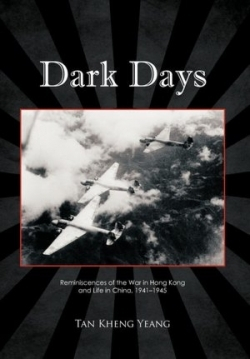Dark Days
Reminiscences of the War in Hong Kong and Life in China, 1941-1945
The city of Hong Kong was established in 1841. At the time it was known primarily for its bustling trade and sense of international connection and freedom. Tan Kheng Yeang, author of Dark Days, is Malaysian by birth; he was a university student in Hong Kong when it fell to the Japanese in 1941.
Yeang states that in the days that followed, the occupiers engaged in looting shamelessly and brutally punishing any local who appeared to be involved in any similar activity. People lived in fear. Begging became a way of life, as did prostitution. Yet the conquerors had the audacity to name the region “East Asia Co-Prosperity Sphere.” The author asserts that “in its practical manifestation, ‘co-prosperity’ euphemistically denoted ‘exclusive exploitation.’” He characterizes the Japanese as cold, arrogant racists, untrustworthy because they did not even trust each other.
Yeang and some university friends decided to leave Hong Kong, and they stealthily escaped at night, by boat, to Free China. There Yeang was able to use his training as a civil engineer to assist in the construction of an airport in Guangxi Province. He observed the culture of Free China, concluding that, though the countryside was beautiful in places, the villages were primitive and the village system held people back. Yeang found that towns, instead, offered conveniences in an efficient way while not preventing citizens from pursuing agriculture. He was enchanted by the city of Kumming in particular, with its parks, pools, temples, and natural surroundings. To be in such a tranquil place after the deprivations and upheavals of war was a highlight, although Yeang admits, “it probably appeared to me more wonderful than it really was.” But even in Kumming, Yeang was met at one point with the sound of gunfire and a curfew, the results of a local government dispute.
In 1945, after the war, the author returned briefly to Hong Kong. He found it curiously unchanged, noting only that the pace of life had slowed, dulled by the years of occupation, during which initiative was stifled and people lived in dire poverty and constant fear.
Yeang is a practiced writer, author of works of fiction, poetry, philosophy, and linguistics. He has a talent for telling uncomfortable truths in a rational style. Though Dark Days is limited in its historical scope, it would make fine reading material for anyone wanting to understand more about wartime conditions for ordinary people in China, as well as the clash between Asian cultures. Yeang aptly describes the situation for Hong Kong residents during the Japanese occupation as “the twilight of dull misery, waiting for the dawn of liberation.”
Reviewed by
Barbara Bamberger Scott
Disclosure: This article is not an endorsement, but a review. The publisher of this book provided free copies of the book and paid a small fee to have their book reviewed by a professional reviewer. Foreword Reviews and Clarion Reviews make no guarantee that the publisher will receive a positive review. Foreword Magazine, Inc. is disclosing this in accordance with the Federal Trade Commission’s 16 CFR, Part 255.

